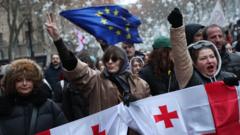In recent months, the Georgian Dream party has faced intense scrutiny and allegations of election fraud after its parliamentary victory in October 2023. Despite winning a majority, the election sparked widespread protests from opposition groups, who have refused to endorse Kavelashvili and are boycotting parliament. The political climate has led to a growing divide, as many Georgians express their desire for closer ties with the European Union, a stance that has placed them at odds with their current government, which has increasingly adopted authoritarian measures reminiscent of Russia's policies.
Protesters have displayed their frustration by waving Georgian and European Union flags, voicing a collective desire to distance their nation from Russia's influence. One protester stated their release from "the claws of the Russian empire" as the driving force behind their activism. The recent history of Georgia has been marred by the government’s refusal to join sanctions against Russia following its invasion of Ukraine, further complicating the political landscape.
At the center of this turmoil is the refusal of Zourabichvili to relinquish her position, leading to threats of criminal charges should she choose to stay in office. Her denunciation of Kavelashvili's election—which took place under a controversial electoral college system—has galvanized public support for pro-EU protests, setting the stage for a potential political showdown.
As the inauguration day approaches, the nation stands divided between the ruling party's authoritarian grip and the pro-European protests demanding accountability, transparency, and a definitive pathway towards EU accession. The coming days may prove critical in determining the trajectory of Georgia's political future.
Protesters have displayed their frustration by waving Georgian and European Union flags, voicing a collective desire to distance their nation from Russia's influence. One protester stated their release from "the claws of the Russian empire" as the driving force behind their activism. The recent history of Georgia has been marred by the government’s refusal to join sanctions against Russia following its invasion of Ukraine, further complicating the political landscape.
At the center of this turmoil is the refusal of Zourabichvili to relinquish her position, leading to threats of criminal charges should she choose to stay in office. Her denunciation of Kavelashvili's election—which took place under a controversial electoral college system—has galvanized public support for pro-EU protests, setting the stage for a potential political showdown.
As the inauguration day approaches, the nation stands divided between the ruling party's authoritarian grip and the pro-European protests demanding accountability, transparency, and a definitive pathway towards EU accession. The coming days may prove critical in determining the trajectory of Georgia's political future.





















